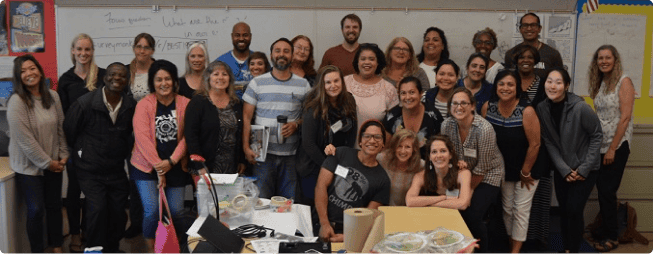Accessing community resources and support services is essential for building connections, accessing assistance, and fostering a sense of belonging. From community centres to legal aid resources, this guide provides insights and practical tips to help Africans in London navigate and access essential community resources and support services.
Community Centres
Africans in London can participate in community events, workshops, and activities to meet neighbours, make friends, and explore shared interests. Community resource centres serve as hubs for social, recreational, and educational activities, fostering community engagement and cohesion. They provide programs and services tailored to diverse cultural, social, and demographic needs. Some well-known community centres in London are Whitmore, Marchmont, Greenside, and Little London.
Local NGOs and Non-profits
Non-governmental organisations (NGOs) and non-profits play critical roles in solving social concerns, advocating for marginalised populations, and providing basic services. Africans in London can connect with local non-governmental organisations (NGOs) and non-profits that work on problems like education, healthcare, housing, and social justice. Volunteer programs, internships, and advocacy campaigns provide chances for engagement and impact.
Support Groups
Support groups offer a safe and friendly environment for people going through common struggles or life transitions. Africans in London can attend support groups for mental health, drug recovery, parenthood, grieving, and cultural adjustment. Participation in support groups promotes peer support, mutual understanding, and emotional resilience during times of need.
Public Resource Libraries
Individuals and families can benefit from the plethora of resources, information, and educational opportunities available in public libraries. Africans in London can use public libraries to borrow books, attend workshops, and use computer and internet resources. Investigate library activities and services such as literacy programs, language classes, and cultural events that encourage lifelong learning and community involvement.
Check out the London library page HERE.
Community Health Clinics
Access to healthcare services is critical for sustaining physical and mental health. Africans in London have access to community health clinics, primary care centres, and public hospitals for medical consultations, preventive treatment, and health screening. Explore community health projects that target unique health needs and inequities in varied communities. Some highly reviewed community health clinics within London include; Central London Community Healthcare, Holloway Community Health Centre, Central London Healthcare CIC, East London Community Ltd, Spitalfields Community Health Centre and lots more.
Food Banks and Pantries
Food banks and pantries give critical assistance to people and families experiencing food insecurity and hunger. Africans in London can benefit from food assistance programs provided by local charities, churches, and community organisations. Volunteer at food banks, contribute food items or seek assistance in obtaining nutritional meals and food resources during times of need.
Legal Aid Resources
Individuals have access to legal aid resources and services, ensuring that they can seek justice and legal assistance when necessary. Africans in London can get legal help, information, and representation from legal aid clinics, pro bono lawyers, and community legal centres. Address legal difficulties such as immigration, housing, employment, and civil rights with free or low-cost legal assistance. Some legal agencies in London also offer free consultancy and representation services.
Senior Citizen Services
Senior citizen services address the needs and well-being of older persons by encouraging independence, social involvement, and quality of life. Africans in London have access to senior centres, daycare programs, and social services that are tailored to their interests and preferences. Participate in recreational activities, educational initiatives, and support groups that encourage healthy ageing and community involvement. These services to senior citizens include and not limited to housing and properties, health, recreation, and home care.
Youth Empowerment Programs
Empowering youth through education, mentorship, and leadership opportunities benefits communities and promotes positive youth development. Africans in London can participate in youth empowerment programs, after-school activities, and mentoring efforts provided by youth organisations and community centres. Encourage youth to explore their skills, pursue educational aspirations, and make meaningful contributions to society.
Cultural Heritage Initiatives
reserving cultural heritage and valuing diversity strengthens community life and fosters intercultural understanding. Africans in London can take part in cultural heritage programs, festivals, and events that celebrate African culture and traditions. Collaborate with cultural organisations, museums, and heritage places to promote African arts, music, dance, and food, thereby encouraging cultural interaction and appreciation.
Citizen Advice Bureau
The London Citizen Advice Bureau offers free, confidential, and unbiased advice on a variety of topics, such as housing, work, benefits, consumer rights and other community resources. Africans in London can seek assistance from local Citizen Advice Bureaus, which are staffed by qualified advisors who provide information, guidance, and support to individuals and families dealing with a variety of issues. For individualised information and assistance, consult online resources, call helplines, or schedule in-person visits.
What to Look Out For
- Locate local libraries offering free access to books, the internet, and community events.
- Visit community centres providing activities, classes, and social services.
- Explore local councils’ websites for information on housing, benefits, and local services.
- Join community groups and meet-ups to connect with others and build a support network.
- Access healthcare services through the NHS, including registering with a GP and finding nearby clinics.
- Utilise food banks and community kitchens for assistance with food and meals.
- Participate in local cultural and recreational activities such as festivals, sports clubs, and art workshops.
- Seek out language classes and educational programs to improve English skills and further education.
- Find local volunteer opportunities to give back to the community and meet new people.
- Get legal and immigration advice from organisations that specialise in helping newcomers and refugees.

